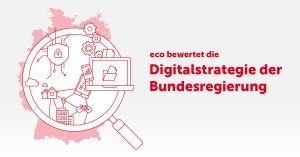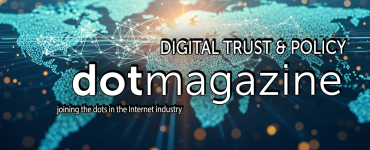- Assessment of the 25 most important digital projects: around one third already implemented, more than half in progress
- Infographic shows implementation in the 5 fields of action: “Digital Competence” & “Innovation and Digital Transformation” far ahead
- Need for action on the issues of “Societal Digital Transformation” and “Infrastructure”
Berlin, October 9, 2019– With its implementation strategy “Shaping Digitalization”, the German federal government aims to prime Germany for the digital future. Today, the German Digital Cabinet is meeting for the third time in Berlin, also with a view to revising the digitalization strategy. eco – Association of the Internet Industry has availed of this opportunity to analyze the 25 most important projects of the strategy and has arrived at a positive conclusion.
Evaluation of the 25 most important digital projects: around one third already implemented, more than half in progress
As Oliver J. Süme, Chair of the eco Board, summarizes: “We have drawn a positive conclusion on the current implementation status of the digitalization strategy: movement is in train when it comes to digital policy issues. The federal government must now stay on the ball and prove by the end of the legislative term that the newly created Cabinet Committee for Digitalization can not only achieve the strategic goals across all ministries, but can also implement the projects consistently across the board.”
Of the 25 most important digitalization projects for the Internet industry, around one third (8) have already been implemented, a further 16 projects are in the process of being implemented, and only one project has yet to make any substantial progress.
eco infographic shows the implementation status of the 5 fields of action: “Digital Competence” & “Innovation and Digital Transformation” far ahead
Above all when it comes to the field of “Digital Competence”, the German federal government has made particularly good progress and has already initiated what eco regards as being the most important projects: “Strong progress has been made at federal level with the Education Pact and the Further Education Strategy, but now the money must also get to the schools. To this end, the federal states must also follow suit, but unfortunately the flow of direct allocation of funding is still faltering in too many federal states,” says Süme.
The eco infographic (in the German language) shows that there is also movement in the area of “Innovation and Digital Transformation”: in February, for example, the German federal government presented its Artificial Intelligence Strategy and announced 3 billion Euros for the coming years in order to have Germany become one of the world’s leading locations for the development and application of AI technologies. It did, however, take too long for the government to distribute the first 500 million Euros to the ministries in 2019, and eco is of the view that this will have to happen much more quickly in the coming year. In September, the German federal government also presented a comprehensive Blockchain Strategy, in which timely legal regulations are promised, especially for the financial sector. This should bring more legal certainty for all parties involved.
Need for action on the topics of “Societal Digital Transformation” and “Infrastructure”
On the other hand, eco still sees a need for action in the area of “Societal Digital Transformation”. Although organizational structures have been created for IT security, a consistently high level of security must now also be achieved. However, the recurrent demand for encryption to be weakened by backdoors is destroying all efforts to set up secure IT systems.
For eco, the expansion of digital infrastructures must also become an even more serious political focus, if Germany does not want to lag further behind in international comparison: “The expansion of digital infrastructures is fundamental and must be driven forward consistently. Political lip service is not enough here, because secure and high-performance digital infrastructures are the prerequisite for all further interconnections and any kind of future technology.”
The infographic is available online in the German language at the following link: go.eco.de/Digitalbilanz




